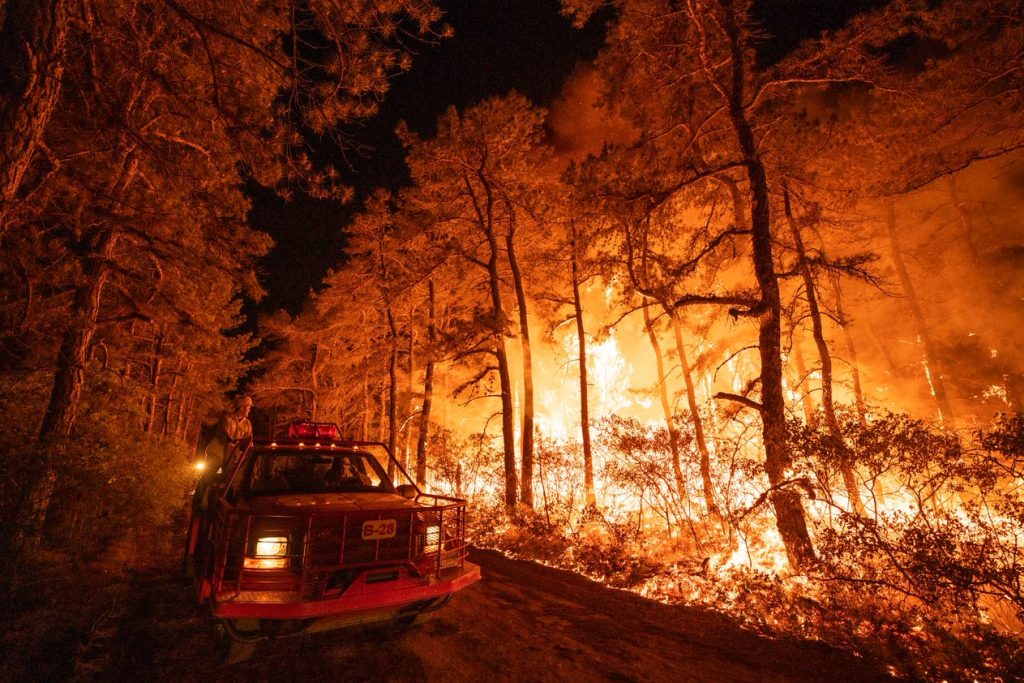
New Jersey sounds alarm on coming wildfire season as drought persists
| March 21, 2025
This story was originally published by The New Jersey Monitor. The Monitor, Delaware Currents and NJ Spotlight News are part of a collaborative of news organizations working together to provide comprehensive climate change coverage for New Jersey.
Four months after state officials declared a drought warning, New Jersey environmental officials said that ongoing, record-setting dry conditions portend a busy wildfire season, and they urged residents to voluntarily conserve water before mandatory restrictions become necessary.
Firefighters already have battled 381 wildfires this year, according to the state fire warden, William Donnelly. While most forest fires in New Jersey don’t spread beyond five acres, three major blazes burned over 100 acres acres. Together, this year’s fires have scorched 1,242 acres, Donnelly said. That’s a 266 percent increase compared to the same time last year, he said.
“Now, peak wildfire season in New Jersey is upon us, at a time when water demand for landscaping, gardening, and lawn care is typically set to increase across the state, as the temperature warms and New Jersey remains under an official drought warning,” said state Department of Environmental Protection Commissioner Shawn LaTourette.
Precipitation not enough to end drought
State geologist Steven Domber rattled off a list of recent meteorological records that have desiccated vegetation and lowered reservoir levels across the state. January was New Jersey’s third driest, while October, and autumn more broadly, were the driest since record-keeping began in 1896.
While February’s precipitation was nearly normal, it wasn’t enough to replenish reservoirs and groundwater, which prevented the state Forest Fire Service from doing prescribed burns that minimize wildfire risk, Domber said.
The service typically targets 25,000 acres of forest, grasslands, and marshlands for prescribed burns but has burned just 1,707 acres of grasslands and six acres of forest because of the drought, he said.
Money added to budget for fire service
Gov. Phil Murphy added $1 million to his $58.1 billion budget proposal for the service to add staff and equipment, said John Cecil, an assistant commissioner in charge of state parks, forests, and historic sites. The state Forest Fire Service now has 70 full-time firefighters and 1,400 part-time firefighters who can be called into service, Cecil said.
An extra $3 million Murphy allocated two years ago helped the service add staff, a bulldozer, upgraded command post radio and communications equipment, personal protective gear, and aviation support, he said.
Officials described New Jersey as an “extreme risk wildfire state” because of its dense, volatile vegetation especially in areas like the Pinelands in South Jersey and the Highlands in North Jersey, and that vegetation’s proximity to homes and other development.
New Jersey likely won’t ever face the devastation southern California suffered in January, when Santa Ana winds fueled fires that decimated parts of Los Angeles and Ventura counties, officials said. LaTourette said he’s not overly worried that the federal funding cuts President Donald Trump has ordered for fire management staff and services will affect New Jersey.
The state Forest Fire Service mostly relies on state funding, not federal, he said. But he also pointed to Attorney General Matt Platkin’s partnerships with other Democratic states in challenging Trump’s various orders in court.
“Now, courts have informed the Trump administration of the import of following the law and the import of minding the coequal branches of government,” LaTourette said. “Funding appropriated by Congress that flows to this agency or DEP, we expect will continue to flow. And if it doesn’t, we will take all appropriate action to make sure that it does.”



![DC_Image [Image 4_Assunpink Meets Delaware] meets Delaware The Assunpink Creek on its its way to meet the Delaware River. The creek passes through woods, industrial and commercial areas and spots both sparkling and filled with litter.](https://delawarecurrents.org/wp-content/uploads/bb-plugin/cache/DC_Image-4_Assunpink-meets-Delaware-1024x768-landscape-14f069364113da5e8c145e04c9f2367c-.jpg)



